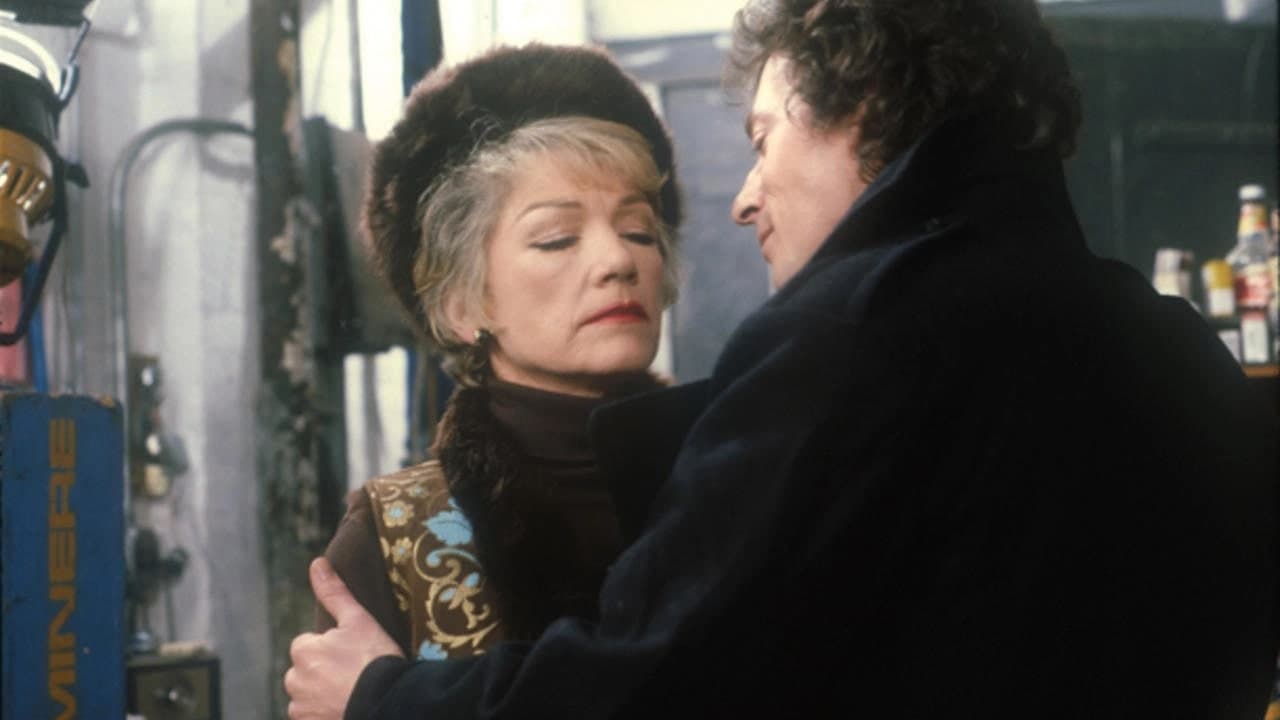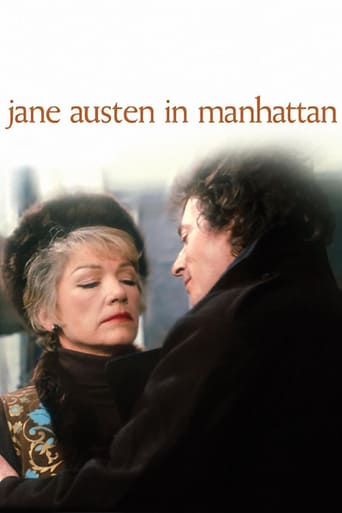Prolabas
Deeper than the descriptions
Mabel Munoz
Just intense enough to provide a much-needed diversion, just lightweight enough to make you forget about it soon after it’s over. It’s not exactly “good,” per se, but it does what it sets out to do in terms of putting us on edge, which makes it … successful?
Zlatica
One of the worst ways to make a cult movie is to set out to make a cult movie.
Fulke
Great example of an old-fashioned, pure-at-heart escapist event movie that doesn't pretend to be anything that it's not and has boat loads of fun being its own ludicrous self.
sol-
Having acquired the rights to a play penned by Jane Austen during her childhood, an avant-garde theatre director attempts to do justice to Austen's words and "bring her up-to-date" while a former associate tries to convince his actors to perform the play more traditionally in this little seen Merchant-Ivory film. Robert Powell, fresh from 'Harlequin' (where he played an equally hypnotic character), is solid as the avant-garde director in question who believes that "we all live in clichés" and that his fey vision is faithful. Anne Baxter in her last big screen performance is also well cast as his former associate. It is not, however, always interesting to watch them argue source material fidelity and with much talk and limited atmosphere and action, 'Jane Austen in Manhattan' has found a reputation as Merchant-Ivory's nadir. Such an assessment may be a little harsh, however, this is very much one of those films where the story behind it is more fascinating than the movie itself. Apparently James Ivory acquired the film rights to Austen's play without having even read it. Upon reading the play and finding it insubstantial for motion picture (Austen was, of course, very young when she wrote it), Ivory almost passed it up until Ruth Prawer Jhabvala suggested making a film about those who wish to and attempt to perform the play - not unlike 'Adaptation.', to which the film sometimes has been compared. This in turn renders 'Jane Austen in Manhattan' one of Merchant-Ivory's most intricate efforts, and if a failure, it is certainly an ambitious one.
tedg
I am usually offended, retroactively offended by Ivory - Jhabvala films. They have a quiet, deep consistency that draws respect the same way a cathedral does. But the uncomplicated emotional links and the sentimental world in which they exist gets to me, and taints dreams for days afterward.Good news. Here is that same hushed god of relationships and presentation, but it is turned on the process of film-making itself. This isn't the complex, multiply nested structure of "Vanya on 42nd Street," but it is similar.In the film, the main arc is two "films" competing with each other to exist. One is the sort of slick, attractive think that is now synonymous with Merchant-Ivory. The other is something more intuitive, emotional, experimental. These two film realities become characters in themselves, resolving in just the same way we would later see the characters in "Remains."The "slick" one is pretty and connects with presentation values we can understand. It is backed by the establishment that finances "art," and thus wins in the contest. Along the way, the worst features of both are highlighted.The "gritty one" requires obedience to a cult, destruction of marriages, ruining of souls and penury. But it transcends and makes one whole. The nicety nice one is a matter of effete conspiracy and Brahman tastes. Needless to say, as we follow writer Jhabvala and her two collaborators, the nicety nice wins, as it does here. And at the same cost.The actors who provide surrogates for these two are lovers who have fallen out. When together, they confuse performance with life. There is a third way, shown by the lost husband of Sean Young's character. His acting has no pretension to art; it is neither ambitious nor pretty, simply entertaining.The device around which this revolves — the script for the competing plays — is a lost manuscript by Jane Austen. As if everything I have mentioned so far is not a sufficient fold of life on the film, this film comes from the acquisition of that same manuscript. You will recall that Austen could be said to have shaped the modern long form novel, based on her own fold: the parallel stories of people who are seriously motivated by the urges of the time overlain with observations on how arbitrary and silly those are. While Merchant, Ivory and Jhabvala are smart enough to know the costs of what they do, they decide anyway. Silly works.Ted's Evaluation -- 3 of 3: Worth watching.
laurel21000
Boring and annoying are two adjectives that spring to mind regarding this film. The only aspect that salvaged it from being completely unbearable was the presence of Anne Baxter.Until she appeared on screen it all just seemed to be a series of disjointed scenes bound only by a shared pretentiousness. And then, boom, there she was and suddenly the electromagnetic field changed.It was interesting to observe how powerful the presence of a single person can be. Because, in this case, Baxter brought a coherence to the film. With her appearance, the different elements seemed to fall into place. At least to a degree.I tried to figure out what it was about her that seemed to make this happen. Was it "star" quality? Was it a gravitas that came from her years of experience? Or did she, as opposed to the other actors here, perhaps resist the "direction" that was being given and merely follow her own course as far as interpreting her character. I don't know. I couldn't figure it out.The only other actor who created a real character as opposed to a caricature was Kurt Johnson who played Victor. And Sean Young was quite good.The others were giant clusters of affectations. Robert Powell who played Pierre was especially annoying. Granted his character was supposed to be so. But he was not interesting annoying. Just annoying annoying.
som1950
This very long1980 movie isn't the worst Merchant/Ivory/Jhabvala movie (that would be "Jefferson in Paris") but is numbingly dull even to an admirer of many of their movies. I'd assign blame mostly to Jhabvala's screenplay about two radically different troupes vying for the chance to première a (real) recently discovered play written at age twelve by Jane Austen. From what we see of it, Austen wasn't much of a playwright at age 12 (who is?!). Jhabvala imagines a charismatic experimentalist Svengali (Robert Powell) pitted against a socially well-connected aging actress whom he had used and abandoned earlier (Anne Baxter in her last big-screen role paying off the sins of Eve Harrington?). She wants to stage an operatic version. It defies plausibility that the experimentalist actors have operatic voices, but the audience has to simply accept that, while trying to care about any of the characters struggling to survive whimsical arts patronage. I could muster a bit of sympathy for Baxter, and more for the very handsome spurned husband played by Kurt Johnson, but couldn't care less about the "star" played by Sean Young (in her first screen role) or about which absurd production got supported and mounted off- Broadway.

